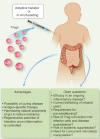Regulatory T-cell therapy for inflammatory bowel disease: more questions than answers
- PMID: 22348589
- PMCID: PMC3403270
- DOI: 10.1111/j.1365-2567.2012.03572.x
Regulatory T-cell therapy for inflammatory bowel disease: more questions than answers
Abstract
T regulatory (Treg) cells are critical for maintaining immune homeostasis and establishing tolerance to foreign, non-pathogenic antigens including those found in commensal bacteria and food. Because of their multiple suppressive mechanisms, Tregs represent a promising strategy for engineering tolerance to self and non-self antigens in chronic inflammatory diseases. Already in clinical trials in the transplantation setting, the question remains whether this therapy would be effective for the treatment of mucosal inflammatory diseases that do not pose an immediate threat to life. In this review we will discuss evidence from both animal models and patients suggesting that Treg therapy would be beneficial in the context of inflammatory bowel disease (IBD). We will examine the role of T-cell versus Treg dysfunction in IBD and discuss the putative antigens that could be potential targets of antigen-directed Treg therapy. Finally, the challenges of using Treg therapy in IBD will be discussed, with a specific emphasis on the role that the microbiota may play in the outcome of this treatment. As Treg therapy becomes a bedside reality in the field of transplantation, there is great hope that it will soon also be deployed in the setting of IBD and ultimately prove more effective than the current non-specific immunosuppressive therapies.
© 2012 The Authors. Immunology © 2012 Blackwell Publishing Ltd.
Figures

References
-
- Shevach EM. Mechanisms of Foxp3+ T regulatory cell-mediated suppression. Immunity. 2009;30:636–45. - PubMed
-
- Sakaguchi S, Wing K, Onishi Y, Prieto-Martin P, Yamaguchi T. Regulatory T cells: how do they suppress immune responses? Int Immunol. 2009;21:1105–11. - PubMed
-
- Curotto de Lafaille MA, Lafaille JJ. Natural and adaptive Foxp3+ regulatory T cells: more of the same or a division of labor? Immunity. 2009;30:626–35. - PubMed
Publication types
MeSH terms
Grants and funding
LinkOut - more resources
Full Text Sources
Other Literature Sources
Research Materials

